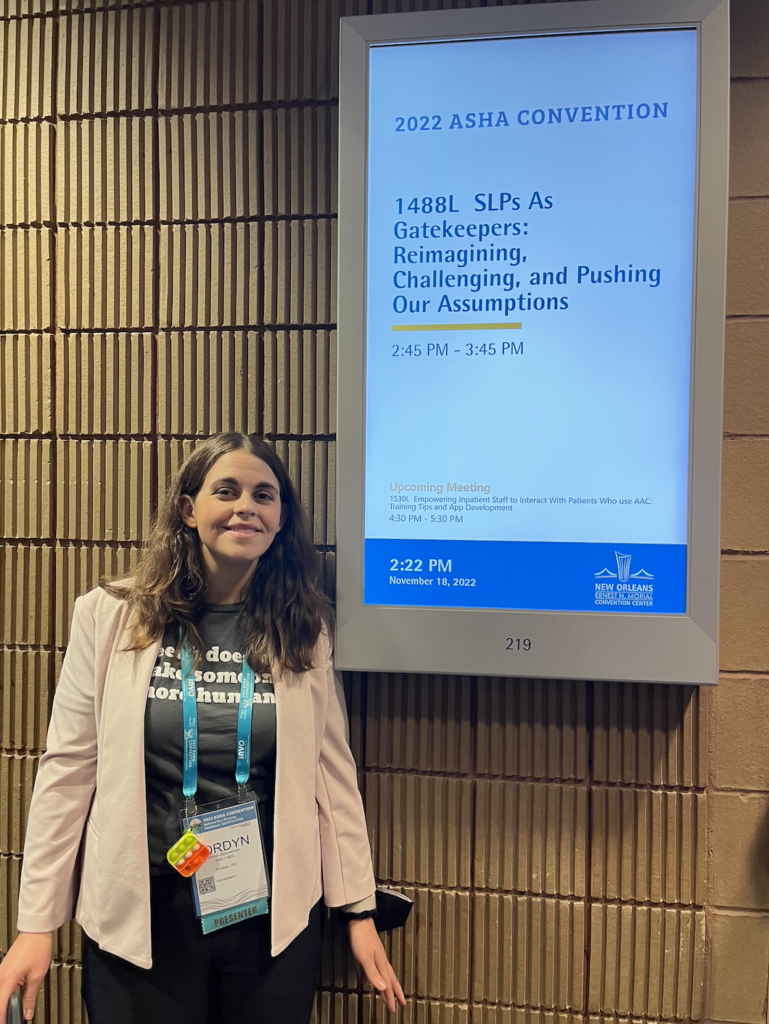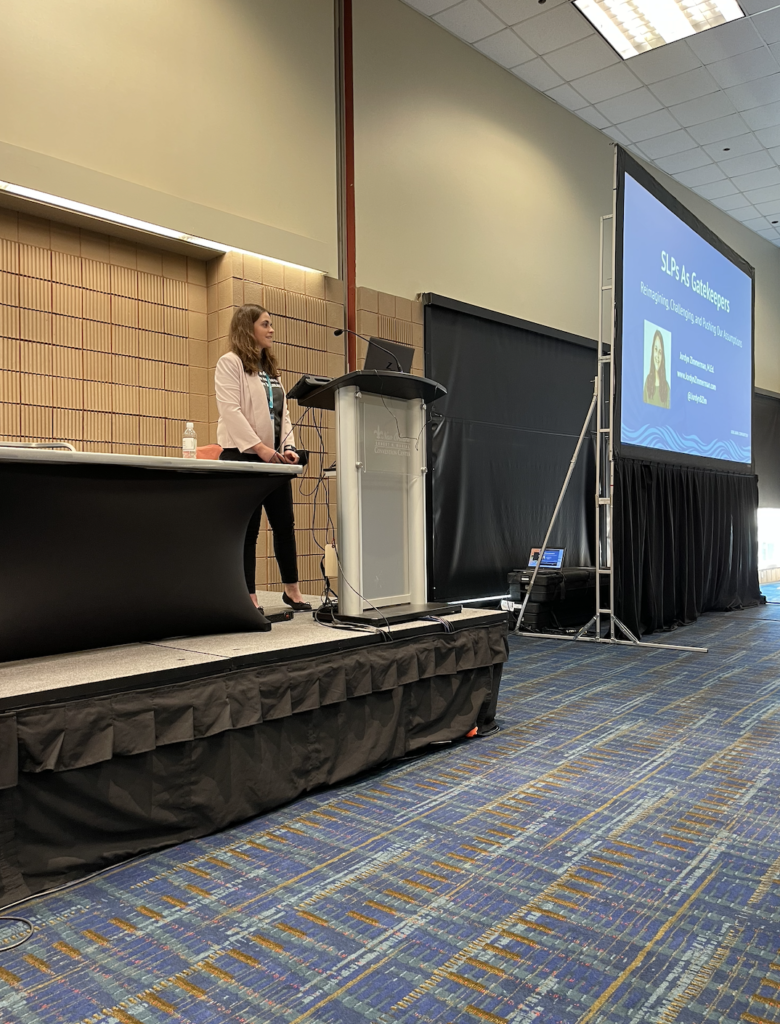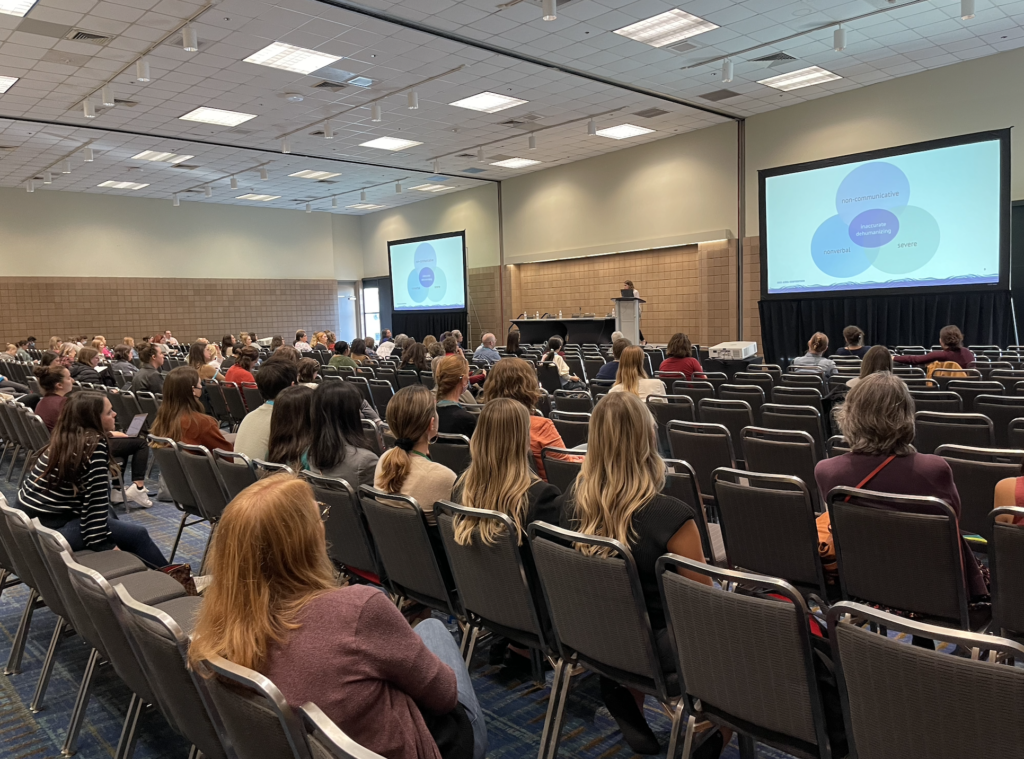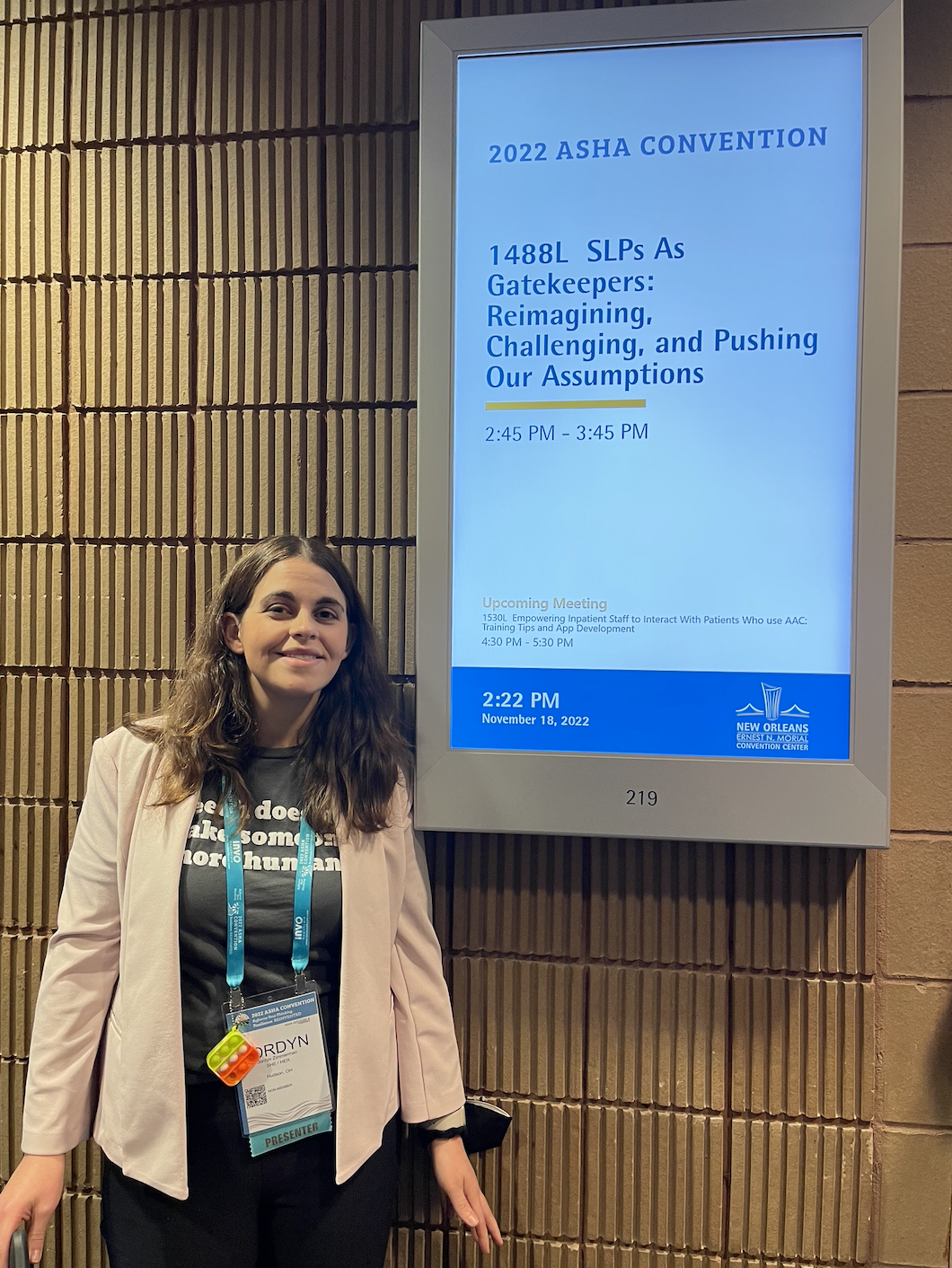Guest blog by Jordyn Zimmerman, M.Ed.
On November 18, 2022, CommunicationFIRST Board Chair Jordyn Zimmerman gave an invited presentation at the American Speech-Language-Hearing Association (ASHA)’s Annual Convention in New Orleans entitled, “SLPs as Gatekeepers: Reimagining, Challenging, and Pushing Our Assumptions.” The presentation generated lots of discussion, with one attendee commenting, “We all need to hear this and we need to hear it spoken this plainly. It’s the most substantive content I have ever seen delivered at this convention, and so overdue.” We are grateful Jordyn has agreed to let us publish a shortened version of her remarks here for those who missed it.
1. Your Job Is Really Important.
I have a provocative title on purpose, because I believe your job as SLPs is really important. In many cases, someone’s communication lies with you, in the decisions you make, and the access you choose to provide. You play a pivotal role.

2. What Is Ableism?
First, a note about ableism. Talila Lewis defines ableism as a “system of assigning value to people’s bodies and minds, based on societally constructed ideas of normalcy, productivity, desirability, intelligence, excellence, and fitness. These constructed ideas are deeply rooted in eugenics, anti-Blackness, misogyny, colonialism, imperialism, and capitalism. This systemic oppression leads to people and society determining people’s value based on their culture, age, language, appearance, religion, birth or living place, ‘health/wellness,’ and/or their ability to satisfactorily re/produce, ‘excel,’ and ‘behave.’ You do not have to be disabled to experience ableism.”
Broken down a bit, ableism is when we pathologize people, and we assign them value. And then we decide if they should communicate, how they should communicate, and if they are worthy, based on how we have just pathologized them.
One example of where ableism is often displayed in AAC is when the only type of communication support that is provided to students is PECS. But PECS is a requesting system, not a communication system. It assumes that the student has a language disability, rather than a speech disability. There is serious harm in limiting someone’s communication to a few picture cards in that the student is only allowed to communicate the few words that have been preselected by another person. When we limit or control someone’s communication, we are deciding their worth and assigning them value.
Another example of ableism in AAC is when teachers motivate students to communicate by giving pieces of candy. Rewarding disabled people with candy for communicating on their terms is damaging to their self esteem, and is worse than the way dogs are treated when they communicate. It is ableist to treat disabled people as if they don’t realize you are manipulating or fooling them.
3. Non-communicative? Nonverbal? Complex? Severe? Profound?
At some time or another, even after finally gaining access to effective communication at the age of 18, I was referred to with all of these words. Professionals labeled me “non-communicative,” and described my limited speech as “unintelligible.” They wrote that I was “nonverbal,” and my communication was “complex,” due to what they described as “challenging behaviors.” And I was called “severely,” as well as “profoundly,” disabled.
All of this was dehumanizing, and all of it is and was inaccurate, even when I didn’t have robust AAC.
I believe this framing also played a fundamental role in denying me access to effective communication for so long.
Non-communicative is inaccurate because everyone communicates. People may use body movements, which can include blinking, breathing, and moving away or towards something. They may type, point, or spell. There are so many ways to communicate, and each one is valid!
Nonverbal is also inaccurate because speech is not the same as language. The Latin root of “verb” – verba or verbum – means word, and thus the term verbal means with language. Describing us as nonverbal suggests that you believe we are without language.
Rather, I urge us to talk about the services and supports someone may use or benefit from. This humanizes individuals, is precise, and allows people to get their needs met without euphemisms that minimize our existence.
For other resources on this topic see the results of a recent AssistiveWare survey and a forthcoming guide from CommunicationFIRST (sign up for our newsletter to get notified when it is released).
4. Speech Versus Language
Thinking about terminology, speech and language are not the same thing, and this matters in how you think about us as people who need AAC.
 Speech is the motor process of expressing language. Language is a cognitive process that involves perceiving, understanding, and producing concepts. Speech and language are processed in different parts of the brain. Terms such as “nonverbal” incorrectly imply that someone cannot understand or use language. But that is impossible to know unless a person has been given appropriate communication tools and supports to actually convey that information. Otherwise, there is no basis to assume that someone with a speech disability does not understand language.
Speech is the motor process of expressing language. Language is a cognitive process that involves perceiving, understanding, and producing concepts. Speech and language are processed in different parts of the brain. Terms such as “nonverbal” incorrectly imply that someone cannot understand or use language. But that is impossible to know unless a person has been given appropriate communication tools and supports to actually convey that information. Otherwise, there is no basis to assume that someone with a speech disability does not understand language.
When we are assumed to be incapable of understanding language, no effort is then made to provide us access to robust, language-based AAC that would allow us to prove otherwise.
As my story highlights, this is a really harmful assumption. For years, people talked about me like I couldn’t understand them, and even like I didn’t exist. I was easily controlled and manipulated by adults, made to complete repetitive tasks with the belief that I didn’t understand them or my surroundings. I was also provided access to PECS and other picture cards with the hope of me requesting basic items or activities, such as the bathroom, cookies, specific people, etc. But those picture cards were inherently limiting and made me extremely frustrated and overwhelmed due to the fact that they were difficult to access. They also impeded my ability to show others that I did have intact thinking. Without any way to show my language, I remained segregated, often in a room completely by myself, fighting through repetitive tasks.
When we respect speech as a motor function, and language as a cognitive function, we can have higher expectations for the people around us.
5. The Importance of Effective Communication
Effective communication is so important in all facets of life. It’s recognized as a fundamental human right, a basis for all other human rights. It’s an access point for everything else. However, effective communication strategies are often denied when someone is presumed to lack “communicative intent.” That “lack of communicative intent” is then used to justify not providing access and denying the very tools we need.
But we can’t prove “communicative intent” without effective communication tools in the first place!
For me, this cycle was nothing short of torture. It often continues indefinitely because it is very difficult to prove you understand language when you are being denied language-based supports that work for you on the basis that you do not understand language. I lived this trauma for 18 years. Professionals focused on my behavior, and assumed that I would not be able to express myself with any form of language, assuming I had none. This led me to be segregated and denied access to curricular opportunities. It took years of advocacy for me to receive the appropriate communication supports and even then, it was difficult for folks to recognize that I belonged, and that I was “worthy” of equal opportunity. In fact, it is still hard for people to accept me in many spaces.
So what is effective communication? Effective communication is about supporting the person to communicate in a way that works for them, and feels good to them. Every AAC user must have unlimited access to the alphabet so they can create original and unlimited output at their discretion, and with support as needed.
6. Takeaways
Assume a trauma history: Any period of time without an effective form of communication is traumatic. As AAC users, many of us have been without an effective means to communicate for days, weeks, months, or years. Whenever one goes that long without communicating, there will always be a scenario where something has happened without our consent, or a situation that was unpleasant and where we couldn’t communicate otherwise. These things impact our lives in big ways. Don’t give up on giving us access to AAC that works for us. And be sensitive to our trauma history and give us time to heal.
Everyone has language: Anytime you address an AAC user or someone who needs AAC, please assume that they understand everything. Speak to them appropriately for their age. Don’t baby things down, or leave information out. Our age reflects many years of lived experience and life. The damage from years of people speaking in front of me like I didn’t understand or feel affects me each day. It is so important to understand that an IQ score doesn’t consider our ways of being, and that access to effective communication matters. When we start with the notion that everyone has the capacity to understand and use language, we can then provide access to the entire alphabet without controlling and manipulating a person with a disability by limiting their vocabulary.
You can have good intentions and be ableist: I think we can all agree that all humans are worthy and all peoples’ ways of being, including communicating, must be honored. There is absolutely no reason why someone should be denied access to robust, language-based communication, or why any communication choice should be questioned. If we believe this, we must support all people to thrive as they are, and as they want to be. But to do this, we must ensure our intentions and impact are aligned. We have to be anti-ableist, because when we are anti-ableist, we honor everyone as they are, in all the spaces they want to be in.


